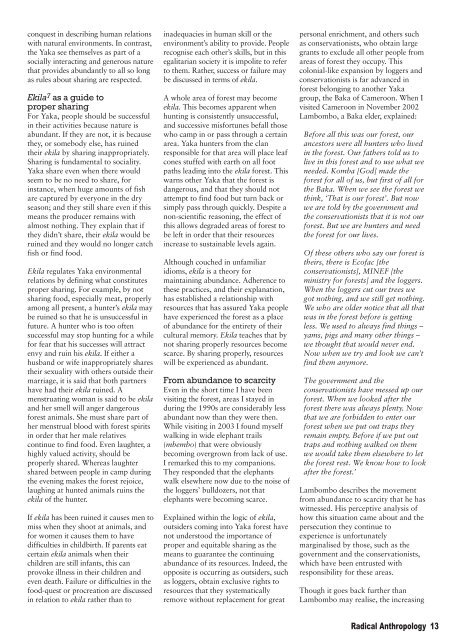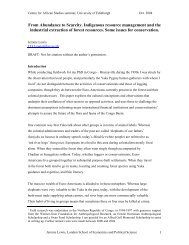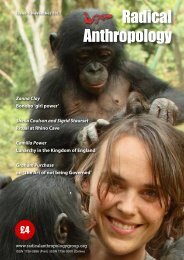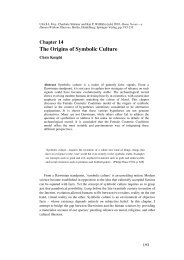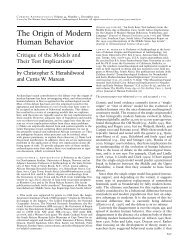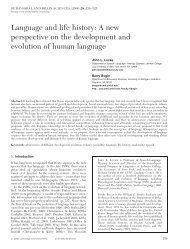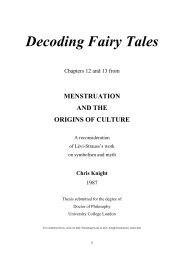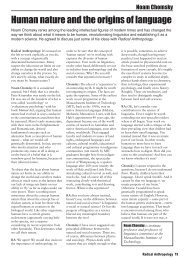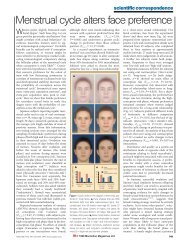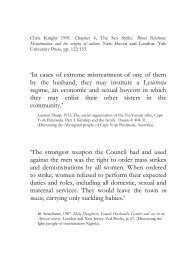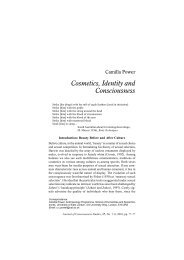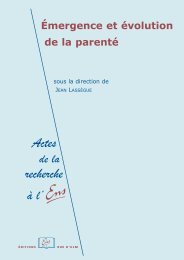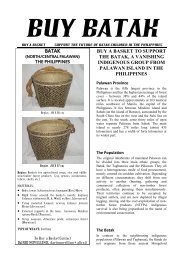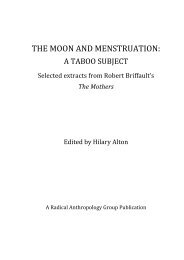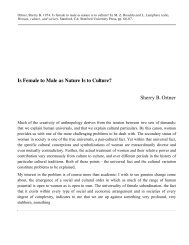The scarcity myth The scarcity myth - Radical Anthropology Group
The scarcity myth The scarcity myth - Radical Anthropology Group
The scarcity myth The scarcity myth - Radical Anthropology Group
You also want an ePaper? Increase the reach of your titles
YUMPU automatically turns print PDFs into web optimized ePapers that Google loves.
conquest in describing human relations<br />
with natural environments. In contrast,<br />
the Yaka see themselves as part of a<br />
socially interacting and generous nature<br />
that provides abundantly to all so long<br />
as rules about sharing are respected.<br />
Ekila 7 as a guide to<br />
proper sharing<br />
For Yaka, people should be successful<br />
in their activities because nature is<br />
abundant. If they are not, it is because<br />
they, or somebody else, has ruined<br />
their ekila by sharing inappropriately.<br />
Sharing is fundamental to sociality.<br />
Yaka share even when there would<br />
seem to be no need to share, for<br />
instance, when huge amounts of fish<br />
are captured by everyone in the dry<br />
season; and they still share even if this<br />
means the producer remains with<br />
almost nothing. <strong>The</strong>y explain that if<br />
they didn’t share, their ekila would be<br />
ruined and they would no longer catch<br />
fish or find food.<br />
Ekila regulates Yaka environmental<br />
relations by defining what constitutes<br />
proper sharing. For example, by not<br />
sharing food, especially meat, properly<br />
among all present, a hunter’s ekila may<br />
be ruined so that he is unsuccessful in<br />
future. A hunter who is too often<br />
successful may stop hunting for a while<br />
for fear that his successes will attract<br />
envy and ruin his ekila. If either a<br />
husband or wife inappropriately shares<br />
their sexuality with others outside their<br />
marriage, it is said that both partners<br />
have had their ekila ruined. A<br />
menstruating woman is said to be ekila<br />
and her smell will anger dangerous<br />
forest animals. She must share part of<br />
her menstrual blood with forest spirits<br />
in order that her male relatives<br />
continue to find food. Even laughter, a<br />
highly valued activity, should be<br />
properly shared. Whereas laughter<br />
shared between people in camp during<br />
the evening makes the forest rejoice,<br />
laughing at hunted animals ruins the<br />
ekila of the hunter.<br />
If ekila has been ruined it causes men to<br />
miss when they shoot at animals, and<br />
for women it causes them to have<br />
difficulties in childbirth. If parents eat<br />
certain ekila animals when their<br />
children are still infants, this can<br />
provoke illness in their children and<br />
even death. Failure or difficulties in the<br />
food-quest or procreation are discussed<br />
in relation to ekila rather than to<br />
inadequacies in human skill or the<br />
environment’s ability to provide. People<br />
recognise each other’s skills, but in this<br />
egalitarian society it is impolite to refer<br />
to them. Rather, success or failure may<br />
be discussed in terms of ekila.<br />
A whole area of forest may become<br />
ekila. This becomes apparent when<br />
hunting is consistently unsuccessful,<br />
and successive misfortunes befall those<br />
who camp in or pass through a certain<br />
area. Yaka hunters from the clan<br />
responsible for that area will place leaf<br />
cones stuffed with earth on all foot<br />
paths leading into the ekila forest. This<br />
warns other Yaka that the forest is<br />
dangerous, and that they should not<br />
attempt to find food but turn back or<br />
simply pass through quickly. Despite a<br />
non-scientific reasoning, the effect of<br />
this allows degraded areas of forest to<br />
be left in order that their resources<br />
increase to sustainable levels again.<br />
Although couched in unfamiliar<br />
idioms, ekila is a theory for<br />
maintaining abundance. Adherence to<br />
these practices, and their explanation,<br />
has established a relationship with<br />
resources that has assured Yaka people<br />
have experienced the forest as a place<br />
of abundance for the entirety of their<br />
cultural memory. Ekila teaches that by<br />
not sharing properly resources become<br />
scarce. By sharing properly, resources<br />
will be experienced as abundant.<br />
From abundance to <strong>scarcity</strong><br />
Even in the short time I have been<br />
visiting the forest, areas I stayed in<br />
during the 1990s are considerably less<br />
abundant now than they were then.<br />
While visiting in 2003 I found myself<br />
walking in wide elephant trails<br />
(mbembo) that were obviously<br />
becoming overgrown from lack of use.<br />
I remarked this to my companions.<br />
<strong>The</strong>y responded that the elephants<br />
walk elsewhere now due to the noise of<br />
the loggers’ bulldozers, not that<br />
elephants were becoming scarce.<br />
Explained within the logic of ekila,<br />
outsiders coming into Yaka forest have<br />
not understood the importance of<br />
proper and equitable sharing as the<br />
means to guarantee the continuing<br />
abundance of its resources. Indeed, the<br />
opposite is occurring as outsiders, such<br />
as loggers, obtain exclusive rights to<br />
resources that they systematically<br />
remove without replacement for great<br />
personal enrichment, and others such<br />
as conservationists, who obtain large<br />
grants to exclude all other people from<br />
areas of forest they occupy. This<br />
colonial-like expansion by loggers and<br />
conservationists is far advanced in<br />
forest belonging to another Yaka<br />
group, the Baka of Cameroon. When I<br />
visited Cameroon in November 2002<br />
Lambombo, a Baka elder, explained:<br />
Before all this was our forest, our<br />
ancestors were all hunters who lived<br />
in the forest. Our fathers told us to<br />
live in this forest and to use what we<br />
needed. Komba [God] made the<br />
forest for all of us, but first of all for<br />
the Baka. When we see the forest we<br />
think, ‘That is our forest’. But now<br />
we are told by the government and<br />
the conservationists that it is not our<br />
forest. But we are hunters and need<br />
the forest for our lives.<br />
Of these others who say our forest is<br />
theirs, there is Ecofac [the<br />
conservationists], MINEF [the<br />
ministry for forests] and the loggers.<br />
When the loggers cut our trees we<br />
got nothing, and we still get nothing.<br />
We who are older notice that all that<br />
was in the forest before is getting<br />
less. We used to always find things –<br />
yams, pigs and many other things –<br />
we thought that would never end.<br />
Now when we try and look we can’t<br />
find them anymore.<br />
<strong>The</strong> government and the<br />
conservationists have messed up our<br />
forest. When we looked after the<br />
forest there was always plenty. Now<br />
that we are forbidden to enter our<br />
forest when we put out traps they<br />
remain empty. Before if we put out<br />
traps and nothing walked on them<br />
we would take them elsewhere to let<br />
the forest rest. We know how to look<br />
after the forest.’<br />
Lambombo describes the movement<br />
from abundance to <strong>scarcity</strong> that he has<br />
witnessed. His perceptive analysis of<br />
how this situation came about and the<br />
persecution they continue to<br />
experience is unfortunately<br />
marginalised by those, such as the<br />
government and the conservationists,<br />
which have been entrusted with<br />
responsibility for these areas.<br />
Though it goes back further than<br />
Lambombo may realise, the increasing<br />
<strong>Radical</strong> <strong>Anthropology</strong> 13


